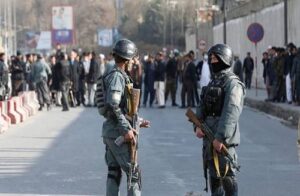
KABUL (SW): The residents of Sankar area of Dasht-e Barchi, along with the other facilities of modern living, have also lacked the electricity. The government has installed the electricity cable towers in this area, however, there is no electricity running through it, instead, they have been provided with solar energy to charge their mobiles and light up their homes.
Sankar is located in the distant and hidden corner of Dasht-e Barchi; somewhere between the city and the village. There are no cars on the road as often people can’t afford to buy cars. Even fares for public transport is not affordable, so residents commute by foot to their homes and Bazar.
To report on the issue of electricity, I traveled to the area to interview the locals and prepare a report. I asked Tahir, a resident of this area, whether the residents are using the solar energy in Sankar area of Dasht-e Barchi? He replied with a smile, saying that apart from the poor who else would use the solar energy! I wanted to explain that the use of sustainable energy is on top of the agenda in developed countries; however, I didn’t want to burden him.
He added that he has a tire-repair shop in Dasht-e Barchi Bazar and is the only person in a family of 7 that works, and his average income is about 200 AFN. He invited me to his house to see the solar panel which generates electricity for his home. However, it was not a house in the real sense; it was only four walls which had a solar panel with a battery in a corner.
Tahir pointed to the solar panel and said that this solar only powers one bulb and can charge the mobile phones. According to Tahir, during the sunny days, the solar panel can charge well, however, during the rainy and cloudy days, it is not better than a candlelight.

A few yards away, I met a woman who was carrying two buckets of water. Her name was Shaista and she is the mother of six children who has been living with her kids in Sankar for years. Shaista is very happy with the distribution of solar panels, saying that when there were no solar panels everyone was sleeping at 7 pm because there was no electricity and it seemed like dark ages.
However, Shaista pointed to the electricity cable towers and said that why the government does not provide them electricity despite that for years the lines and cables had been installed in this area. Shaista expressed concern about the role of government in providing parallel development to all areas, saying that she is looking forward to a day when Sankar area receives electricity so that she can purchase a TV and watch it together with her kids alike other citizens.
I told the situation of Sankar residents and the problems they are facing due to electricity to Wahidullah Tawhidi, the spokesperson of Breshna Shirkat. Mr. Tawhidi tolerantly listened to the stories and information I have gathered from the Sankar area and told me about the plans by Breshna to distribute electricity and solar panels among the people of the Sankar area.
He added that the distribution of solar panels to the poor families was a program of Breshna, which has been implemented with the assistance of the Asian Development Bank for the short term.

According to Mr. Tawhidi, this was the only way to combat the absolute darkness; nevertheless, more than a thousand solar panels have been distributed to residents in Sarobi, Jabbar, Dasht-e Barchi and among communities of returnees and displaced people in the country so far.
Mr. Tawhidi further added that the capacity of storing power by solar panels is much more than Mr. Tahir has claimed. According to Mr. Tawhidi, each page of the panel has 70 hours of energy storage capacity. He said that Breshna Company has distributed 33 thousand four-page screens that have the power to turn on a refrigerator, a TV, a washing machine and cookers to the residents of the border regions of the country.
Officials at the Breshna Company said that plans are underway to provide 15 megawatts of power to the government institutions using solar panels to reduce Afghanistan’s dependency on imported electricity.
Solar panels while depriving the remote and marginalized areas of the capital and other cities of the country of imported electricity, however, it has lit up one bulb in each room to reduce the disgust of darkness.
ENDS





